This blog post is written by Alin Kadfak, researcher at the Department of Rural and Urban Development (SLU), in connection with a visit to Sweden by researchers from the University of Rwanda. The blog post was first published at SIANI’s website.
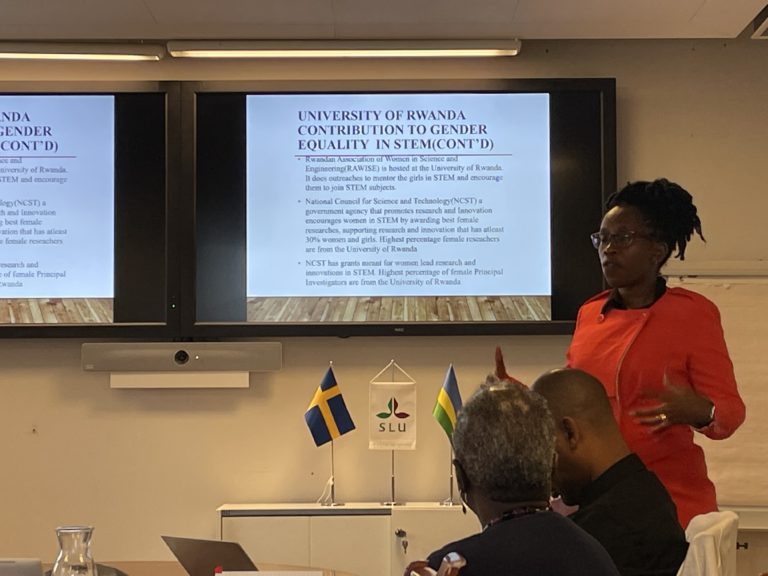
Dr. Jennifer Batamuliza talking about how the University of Rwanda contributes to gender equality in Science, Technology, Engineering and Mathematics (STEM). Photo: SLU Global
Obliged to focus on teaching and engaging with busy research work, researchers often fail to think beyond academic results. Dr. Jennifer Batamuliza and Professor Alfred Bizoza from the University of Rwanda (UR) informed us about techniques for transferring university knowledge to real-world impacts.
What bring you to Sweden?
We are here to continue planning our courses as part of our collaboration between SLU and the UR in one of the fifteen sub-programmes of Sida-funded bilateral capacity-building programmes. The Engendering Rural Transformation and Sustainable Development (ENTRUST) sub-programme has four PhD students, three of whom are studying at the Swedish University of Agricultural Sciences. Since 2017, we have closely collaborated with the Department of Rural and Urban Development and the Department of Economics at SLU. While visiting Sweden, we are collaborating developing two doctoral courses to be integrated at the University of Rwanda. The first PhD course “Farming, food consumption and health”, is being co-designed with Associate Professor Linley Chiwona Karltun of SLU. This is a collaborative undertaking with Dr Franklin Amuakwa Mensah at Luleå University of Technology, where our fourth PhD candidate is based. The second course focuses on “Information Communication Technology, Gender and Rural Transformation”, and we are partnering closely with Associate Professor Caroline Wamala Larsson, based at SPIDER at Stockholm University. Both courses are planned to be run as pilots in May-June 2025 and will be open to PhD students globally, focusing on the African context.
Such true collaboration brings up many lessons from both partners. We have learnt great stories from your works that create real impact on society. Can you share some of those examples with us?
One concern is that gender inequality remains high in the higher learning education in Rwanda. As shown in figure 1, the number of teachers, both male and female, has dropped drastically after primary education. One-fourth of the lecturers at university level are female. There are a serious concern that many of the girls and women do not make it to the top to pursue a professional career.
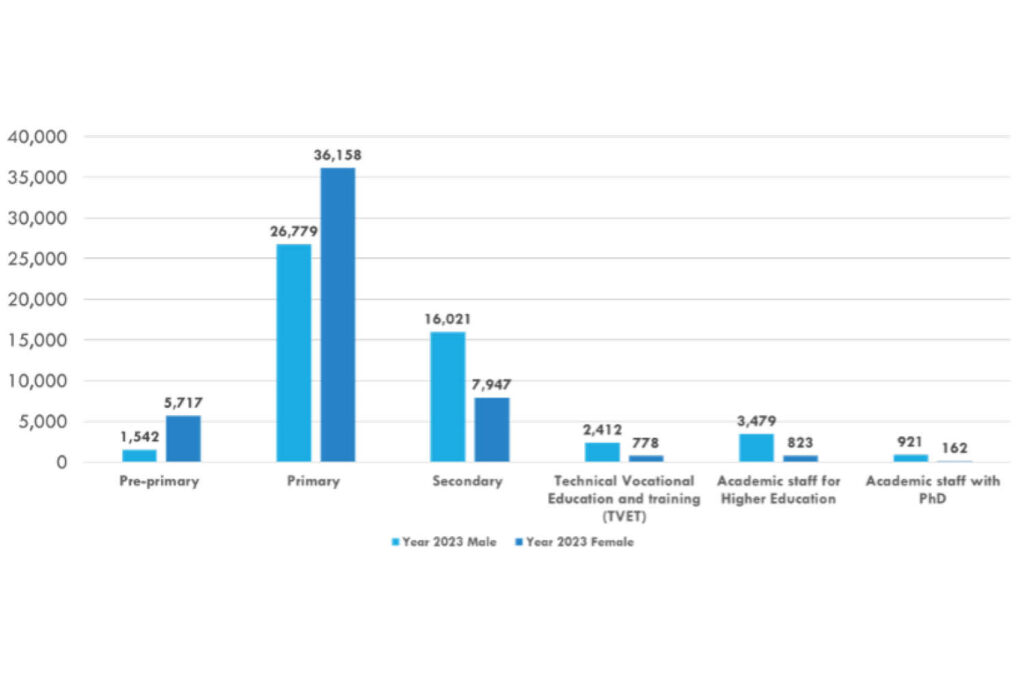
Women and girls make up half of the world’s population and hold half of the world’s human potential. When their lives are improved, the benefits reverberate across society. Access to decent work and regular income in the hands of women, for example, contributes not only to poverty reduction (SDG 1) but also supports better education, health and nutrition outcomes for women and girls and those who depend on them (SDGs 2, 3 and 4).
Mainstreamed diversity and gender perspectives in law and established programmes on gender studies lead to structural changes in institutions to make equality possible. At UR, we have a unique programme that supports girls and women in pursuing their education in science to build a more inclusive and equitable career path in science and technology. This is because we believe that science-related fields play a crucial role in sustainable development and women’s potential for creation and innovation cannot be left behind. Professional education for women is one of the solutions.
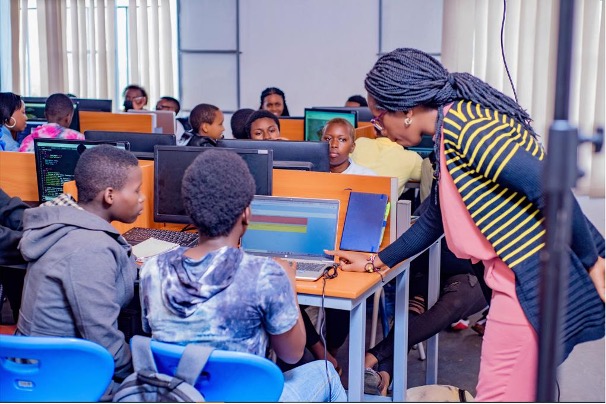
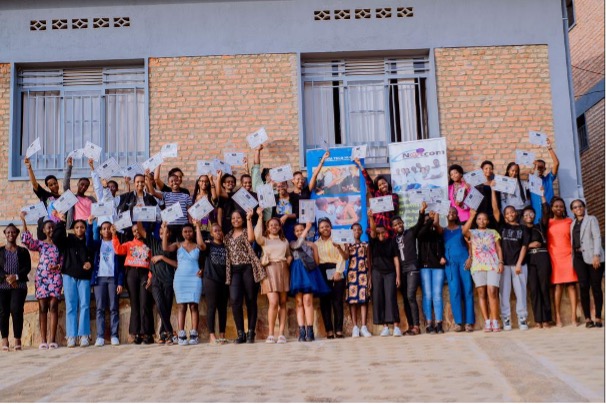
So, it is time to rethink gender relations to science! What is the role of science, technology, engineering and mathematics in countering this challenge?
Yes! STEM is a learning approach that integrates the areas of Science, Technology, Engineering and Mathematics (STEM), and we hope to encourage more girls and women to participate in this programme at our university. As many of us know, STEM is a male-dominated space, and we are trying hard to stop the leaky pipeline of women within the STEM field and create more inclusive workplaces and ecosystems to retain and support women in their STEM career advancement. Gender inequality in STEM is a result of stereotypes, bias and inequality that limits girls’ expectations and professional goals.
In Rwanda, as in many parts of the world, women and girls continue to be subject to social and cultural restrictions. Limited access to education and unfavourable treatments in working environments may hamper women’s advancement. At present, only 32% of young women are entering STEM programmes in Rwanda due to issues such as social and cultural restrictions and societal structure, which need to be changed.
How to address gender inequality through STEM?
There are many things you can do, but here are some points where we have started to see changes.
- Creating role models: at the University of Rwanda, there is the Association of Women in Science and Engineering (RAWISE). This group is self-initiated by many female faculty members who come together and mentor to other female students. Having such a platform creates more than a role model, where the students can see their near future potential, and it provides open and safe spaces to share opportunities and challenges.
- Networking: we started a virtual regional platform that serves as a networking space for women in STEM and helps them share and make available training courses and digital materials. Our university celebrates the International Day of Women and Girls in Science every year.
Can you tell us more about your other outreach activities beyond university gate?
Through the ENTRUST programme, we initiated a Societal University Village Initiative (SUVI) model in 2019, piloted and tested by the UR in 2018. We select “SUVI champions”, graduate students paired with people in the communities, and develop project ideas focusing on rural development, poverty alleviation and food security to implement at village level. Our SUVI champions work with local people to solve the real problems concerning their livelihoods, using the students’ science and technology skills. Results and stories from implementing the model tell us that this model is scalable and impactful.
There are several success stories from SUVI champions. The prominent one is their ability to create their own business plans to address the challenges facing their communities. For instance, SUVI champions are helping small farmers establish kitchen gardens to address issues of malnutrition. Similarly, others have initiated their small businesses, such as livestock rearing (cows, goats, sheep, pig, rabbits) and farming-related activities, such as farming mushrooms and other crops, in collaboration with communities where they are deployed. The SUVI model helps students to create their own jobs after their service through SUVI instead of waiting three to five years before getting employed. This model makes the skills and competencies available for rural transformation and ensures the equity in knowledge distribution across the country rather than being concentrated in the cities.
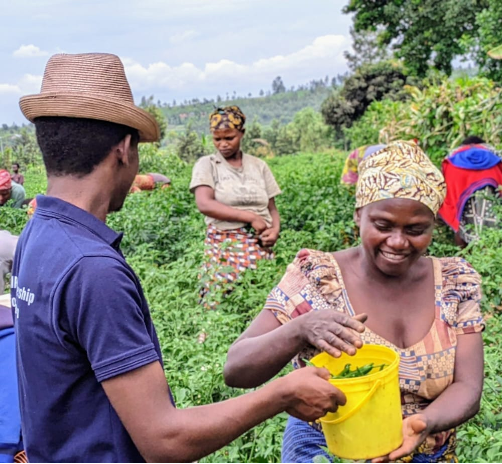
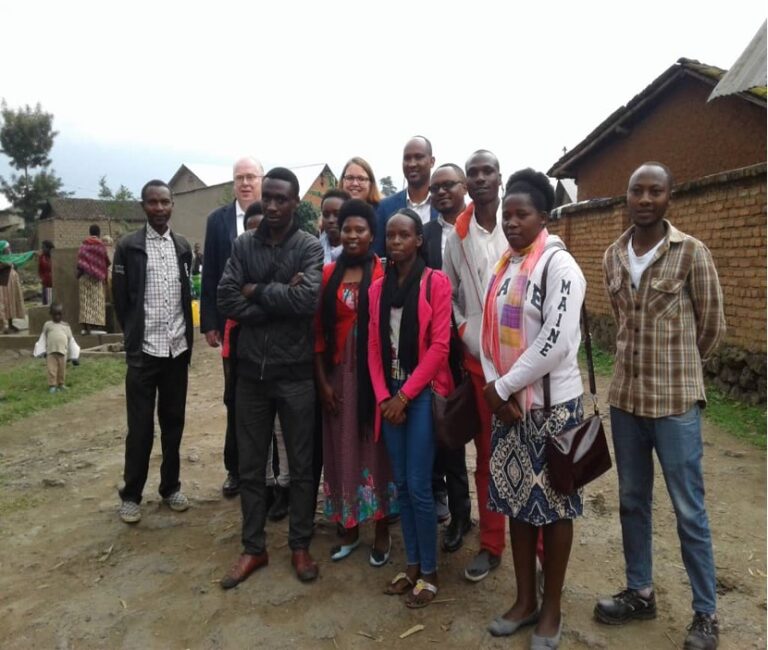
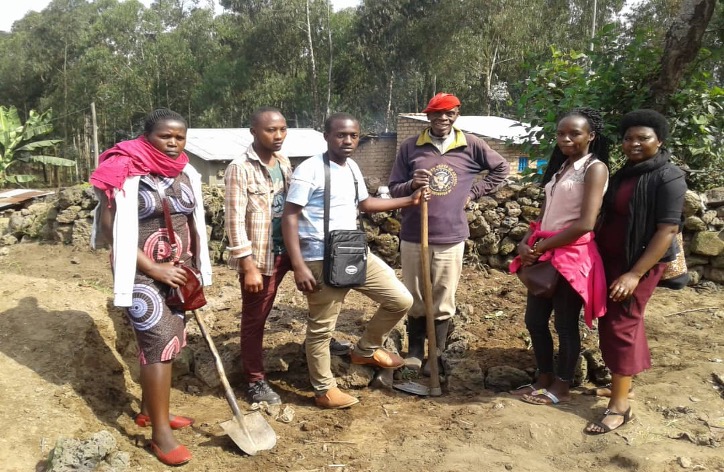
Dr. Jennifer Batamuliza is a lecturer at the University of Rwanda and a head of Data Driven Incubation Hub and Short Professional Courses at African Center of Excellence in Data Science, University of Rwanda. She is also a founder of RWA TECH HUB an organization that trains and mentors girls in ICT.
Prof. Alfred R. BIZOZA is a Professor of Agricultural Economics from the University of Rwanda (UR) with extensive academic and policy research experience in areas of Agricultural Economics, Institutional Economics of Soil and Water Conservation, Economics of Land, Economics of Climate Change Adaptation, and Economic perspectives of Gender.
Associate Professor Linley Chiwona Karltun is a researcher at the Department of Urban & Rural Development, Rural Development division at SLU, and a co-lead investigator for the Sida-funded bilateral capacity building programmes Engendering Rural Transformation and Sustainable Development (ENTRUST) sub-programme.
